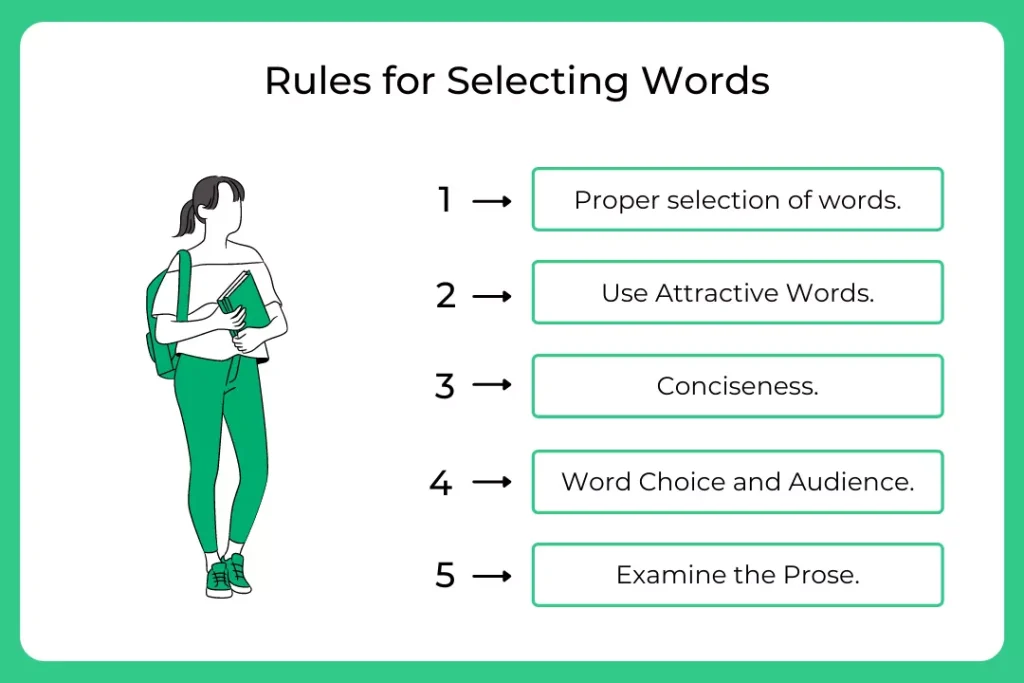Verbal Menu
- Basic Grammar
- Speech and Voices
- Tenses
- Articles
- Tenses and Articles
- Idioms and Phrases
- Subject Verb Agreement
- Prepositions and Conjunction
- Selecting Words
- Relative Pronoun
- Sentence Completion
- Sentence Ordering
- Contextual Vocabulary
- Jumbled Sentence
- Sentence Formation
- Error Identification
- Sentence Improvement and Construction
- Cloze Test
- Fill in the blanks
- Paragraph Ordering
- Para Jumbles
- Synonyms and Antonyms
- Synonyms
- Antonyms
- Reading Comprehension
- Get Off-campus Drive Updates
- Get Hiring Updates
- Contact US
PREPINSTA PRIME
Rules for Selecting Words
Rules For selecting words
Rules for Selecting Words help you understand how to pick the correct word based on grammar, meaning, and sentence structure. In many verbal ability questions, especially in exams and placement tests, choosing the right word is key to getting the correct answer.
On this page, you’ll find a complete guide to the Rules for Selecting Words, with simple explanations, examples, and tips to help you improve.
Whether you’re preparing for exams or just want to strengthen your English, this guide will walk you through everything you need to know.

Rules for Selecting Words
Rule 1 – Proper Selection of Words
- While forming the sentence proper selection of words is very important.
- Words should have accuracy.
- The words should be absolutely right, not close to right.
- The words has to be appropriate to the context so, writer or reader can understand it easily as per the idea of sentence.
- Use the words as a way they are commonly used.
Rule 2 – Use Attractive Words
- The message reader got from the sentence often depends on the words used in sentence.
- Use of poor, incorrect and invalid words can make reader distract so whatever the message you want to convey is missed.
- Always use the attractive words in your sentence so it will be more interesting for audience or reader.
Rule 3 – Conciseness
- Good writing starts with profound respect for words – their denotation, their connotation, their force, their rhythm.
- The sentence should have briefness, compactness and concision.
Rule 4 – Word Choice and Audience
- Choose the words in your sentence have no difficulty, too technical and too easy so, reader may not face any communication barrier.
- Always use the interesting and understandable words so, reader or audience may not get bored.
Rule 5 – Examine the Prose
The choice of words is probably the aspect of prose style that is easiest to discuss.

Prime Course Trailer
Related Banners
Get PrepInsta Prime & get Access to all 200+ courses offered by PrepInsta in One Subscription
Principles of Selecting Words
- Choose understandable words.
- Use specific, precise words.
- Choose strong words.
- Emphasize positive words.
- Avoid overused words.
- Avoid obsolete words.
Common Question Types Involving Word Selection
- Fill in the Blanks
- Sentence Completion
- Contextual Vocabulary
- Word Usage
- Error Spotting (based on incorrect word choice)
Tips to Improve Word Selection Skills
- Read extensively – Improve your vocabulary and understanding of usage.
- Practice with time-bound tests – Simulate exam conditions.
- Make a list of commonly confused words – e.g., affect/effect, imply/infer
- Study word roots, suffixes, and prefixes
- Focus on grammar rules and sentence patterns
Examples for Selecting Words
Pick out the most effective word from the given words to fill in the blanks to make the sentence meaningfully complete.
Question 1:
I Saw a _______ of cows in the field.
a. Herd
b. group
c. Swarm
d. Flock
Correct answer – a. Herd
Explanation –
The correct and complete sentence should be – I saw a herd of cows in the field. Here herd is used as group of cows is known as Herd.
Question 2:
The grapes are now ______ enough to be picked.
a. Ready
b. Mature
c. Ripe
d. Advanced
Correct answer – c. Ripe
Explanation –
The correct and complete sentence will be – The grapes are now ripe enough to be picked. Here Ripe is used as grapes is fruit.
Also Check Out
Also Check:
- Basic Grammar – Questions | Rules | How to Solve Quickly | Tricks & Shortcuts
- Speech and Voices – Questions | Rules | How to Solve Quickly | Tricks & Shortcuts
- Tenses – Questions | Rules | How to Solve Quickly | Tricks & Shortcuts
- Tenses and Articles – Questions | Rules | How to Solve Quickly | Tricks & Shortcuts
- Idioms and Phrases – Questions | Rules | How to Solve Quickly | Tricks & Shortcuts
- Subject Verb Agreement – Questions | Rules | How to Solve Quickly | Tricks & Shortcuts
- Prepositions and Conjunction – Questions | Rules | How to Solve Quickly | Tricks & Shortcuts
- Selecting Words – Questions | Rules | How to Solve Quickly | Tricks & Shortcuts
- Relative Pronoun – Questions | Rules | How to Solve Quickly | Tricks & Shortcuts
- Sentence Completion- Questions | Rules | How to Solve Quickly | Tricks & Shortcuts
- Basic Grammar
Questions
Rules
How to Solve Quickly
Tricks & Shortcuts - Speech and Voices
Questions
Rules
How to Solve Quickly
Tricks & Shortcuts - Tenses
Questions
Rules
How to Solve Quickly
Tricks & Shortcuts - Tenses and Articles
Questions
Rules
How to Solve Quickly
Tricks & Shortcuts - Idioms and Phrases
Questions
Rules
How to Solve Quickly
Tricks & Shortcuts - Subject Verb Agreement
Questions
Rules
How to Solve Quickly
Tricks & Shortcuts - Prepositions and Conjunction
Questions
Rules
How to Solve Quickly
Tricks & Shortcuts - Selecting Words
Questions
Rules
How to Solve Quickly
Tricks & Shortcuts - Relative Pronoun
Questions
Rules
How to Solve Quickly
Tricks & Shortcuts - Sentence Completion
Questions
Rules
How to Solve Quickly
Tricks & Shortcuts
Get over 200+ course One Subscription
Courses like AI/ML, Cloud Computing, Ethical Hacking, C, C++, Java, Python, DSA (All Languages), Competitive Coding (All Languages), TCS, Infosys, Wipro, Amazon, DBMS, SQL and others

 Apply For Jobs
Apply For Jobs Get Hiring Updates
Get Hiring Updates




Login/Signup to comment